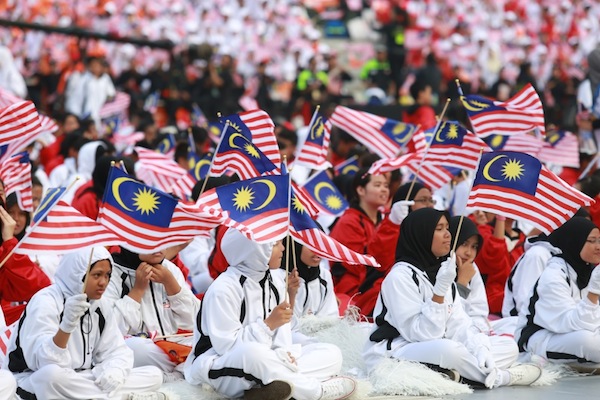International schools are Malaysians’ top pick if reminded of race politics, experiment shows

It was “clear that reminders of Malaysia’s ethnocentrism benefits no one”, noting that its respondents were discouraged from having anything to do with Malaysia if reminded of the nation’s racial divide.
(MMO) – Reminding both Malays and non-Malays about racial politics would unconsciously motivate them to choose international schools over government ones for their children, an experiment has shown.
Research firm Centre for Governance and Political Studies (Cent-GPS) recently conducted an experiment on 100 respondents, where half were “primed” or unconsciously reminded of racial politics, such as by subtly showing them a “keris” or news on a pro-Malay rally, before they answered survey questions.
One of the survey questions asked was on respondents’ schooling preferences for their children, if all factors such as quality of education, distance from home and price were the same for all three choices: public schools, SJK (national-type) schools, and international schools.
The survey found that Malays reacted negatively to subtle reminders of ethnocentrism and the country’s racial divide, with those choosing public schools dropping from 35.5 per cent to 22.6 per cent when primed, and those choosing SJK (national type schools) for their children falling from 42 per cent to 29.1 per cent. Those who chose international schools, however, more than doubled from 22.6 per cent to 48.4 per cent.
“More would go to international schools than send their loved ones to public schools where the curriculum would be set by the government. Fewer would be encouraged to send their kids to public schools when reminded of politicians talking race-based politics,” Cent-GPS said of the Malay respondents’ choices.
Non-Malay respondents similarly reacted negatively, with a drastic reduction in those opting for national schools, while showing greater preference for the other two choices — SJK and international schools.
“Undisturbed, 31.6 per cent of Non-Malay respondents would send their kids to public schools.
“After they were primed, only 10.1 per cent would send their kids to public schools, not confident in the type of syllabus that is handed out by leaders who echo ethnocentric rhetoric,” Cent-GPS said.
For the non-Malay respondents who were primed, there would be an increase from 26.3 per cent to 32 per cent of those opting for SJK schools, and an increase from 42 per cent to 57.9 per cent for international schools.
Based on the figures provided by Cent-GPS, international schools would end up becoming the top choice out of the three for both Malay and non-Malay respondents after they are subtly reminded of the country’s racial divide.
Signals given out
While respondents were told that the three types of schools would have no difference in quality and logistics, Cent-GPS said respondents’ choices signalled how they viewed national education as compared to international syllabuses. It said confidence and faith in Malaysia’s education system played an important factor in the survey.
“If a respondent chooses to send their kids or a loved one to public school, then that would signal strong approval to where Malaysia aims to take its youths.
“Choosing an international school would imply that the respondent would rather not have their loved one associated to whatever direction Malaysia aims to bring its students,” the Kuala Lumpur-based behavioural and social science research firm said in its recently published report.
The report did not specify if the SJK schools were only those using either Mandarin or Tamil as the medium of instruction, or both SJK(C) and SJK(T).
SJK(C) schools have become more multiracial over the years, with the United Chinese School Teachers’ Association of Malaysia’s (Jiao Zong) January 2015 statistics showing that the proportion of non-Chinese students in such schools grew from 11.84 per cent (72,443 students) in 2010 to 15.31 per cent (87,463 students) in 2014, while news reports had said the 2016 batch had 18 per cent non-Chinese.
What about GLCs?
Respondents were also asked if they would allow their children to work in a government-linked company (GLC).
Cent-GPS noted that GLCs have often been in the limelight over “political intervention or top-down mismanagement”, but acknowledged that there are also many GLCs that are successful and professionally managed with little or no interference from the government.
“However, the underlying question here, hidden from the intuition of the respondent, is whether the respondent is okay with allowing one of their loved ones to be associated with whatever is happening in Putrajaya,” it said of this question.
After being primed on race politics, Malay respondents who would “encourage” their children to work in GLCs fell drastically from 35.5 per cent to 12.9 per cent, while those who would “allow” remained about the same at over 48 per cent.
After reminders of the racial divide, Malay respondents who said they were “hesitant” doubled from 12.9 per cent to 25.8 per cent, while those who “refuse” to have their children work in GLCs shot up by more than four times from 3.1 per cent to 12.9 per cent.
“Incredibly, despite the ethnocentric and race-based rhetoric usually favouring the Malays, encouraging for more special treatment and advantages, the Malay respondents here responded negatively, not allowing their children to work at a company linked with the government,” the report said.

